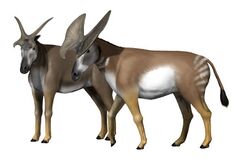Biology:Prolibytherium
| Prolibytherium | |
|---|---|

| |
| Prolibytherium magnieri restoration, with female (left) and male (right) | |
| Scientific classification | |
| Kingdom: | Animalia |
| Phylum: | Chordata |
| Class: | Mammalia |
| Order: | Artiodactyla |
| Family: | †Prolibytheriidae |
| Genus: | †Prolibytherium Arambourg, 1961 |
| Type species | |
| †Prolibytherium magnieri | |
| Species | |
| |
Prolibytherium is an extinct genus of prolibytheriid artiodactyl ungulate native to Middle Miocene North Africa and Pakistan , from around 16.9 to 15.97 million years ago. Fossils of Prolibytherium were found in the Marada Formation of Libya, Vihowa Formation of Pakistan, and the Moghara Formation of Egypt.[1]
Description
The 1.80 metres (5 ft 11 in) long creature would have superficially resembled an okapi or a deer. Unlike these, however, Prolibytherium displayed dramatic sexual dimorphism, in that the male had a set of large, leaf-shaped ossicones with a width of 35 centimetres (14 in), while the female had a set of slender, horn-like ossicones.[2]
The taxonomic status of Prolibytherium remains in flux. At one time, it was described as a relative of Sivatherium (as a precursor to "Libytherium maurusium" (S. maurusium)). Later, it would be regarded as a palaeomerycid, or either as a climacoceratid, or as a basal member of Giraffoidea. With the discovery and study of a female skull in 2010, Prolibytherium is tentatively confirmed as a climacoceratid.[2] A recent study published in 2022 found it to be part of a separate family, Prolibytheriidae.[3]
References
- ↑ "Prolibytherium". http://www.fossilworks.org/cgi-bin/bridge.pl?a=taxonInfo&taxon_no=42706. Retrieved 13 June 2014.
- ↑ 2.0 2.1 Sánchez, Israel M.; Quiralte, Victoria; Morales, Jorge; Azanza, Beatriz; Pickford, Martin (2010). "Sexual dimorphism of the frontal appendages of the early Miocene African pecoran Prolibytherium Arambourg, 1961 (Mammalia, Ruminantia)". Journal of Vertebrate Paleontology 30 (4): 1306–1310. doi:10.1080/02724634.2010.483555. Bibcode: 2010JVPal..30.1306S.
- ↑ Wang, S.-Q.; Ye, J.; Meng, J.; Li, C.; Costeur, L.; Mennecart, B.; Zhang, C.; Zhang, J. et al. (2022). "Sexual selection promotes giraffoid head-neck evolution and ecological adaptation". Science 376 (6597): 1306–1310. doi:10.1126/science.abl8316. PMID 35653459.
External links
Wikidata ☰ Q729196 entry
